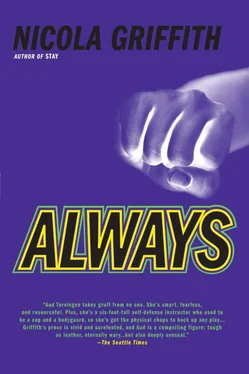We flew over the familiar four-chimney building of one of Seattle’s bigger biotech companies. Kick’s head turned to watch it diminish behind us.
Clouds were streaming up from the southwest. The plane bumped a little as it cut over Queen Anne Hill—no fires over Troy in the early afternoon— over Fremont and its troll, Wallingford and Kick’s house, and turned sharply to come south over the northeastern horn of Lake Union.
The pilot turned slightly and made an up-and-down hand shape: bumpy landing ahead. We both nodded and smiled: risk, the spice of life. I left my cheek by hers—soft and dry as a well-handled cotton sheet—all the way down.
The pilot taxied to the dock and turned off the rotor. The silence was shattering. “So,” she said, “want to come back to my place and look at MRIs?”
WE SPREADthem out on the dining room table and I held them up one by one to the light while Kick commented.
“That’s my favorite,” she said. “My eyes look just like pickled eggs.” They did: enormous, bulging white orbs starting from a delicate grey skull. I could see the folds of her brain, the bone of nose and cheek, even a line of ligament.
“The lesion—or plaque, as Dr. Whittle insisted on calling it—is that tiny little fleck of greyish white there. No, there. See?”
I peered at the stiff, plastic film. “No.”
“Give it to me. There. I think. Or maybe there. Hmmn. Do you know where the parietal lobe is?”
“No.”
“Well, that’s where Whittle said it was. The left parietal lobe. If it was a lesion—sorry—plaque at all. He said he wasn’t really sure, it was so small.”
“All right.”
“The parietal is where you store your nouns: chair, hat, cat, mat. So if I forget your name, you know why. Just kidding. Now this one”—she sorted through the slippery pile, pulled one from the bottom—“this one’s where the real action is.”
Looking at her spinal MRI was like looking at something left hanging from a tree after the vultures have been at it: bones, stripped bare, hanging in a knobby, gristly curve in the middle of nothing. I was suddenly, viscerally glad they didn’t do these things in color.
“This, apparently, is the thoracic spine. And there, that big white splotch, on the left side of the spinal cord, is what’s causing the trouble.”
“You sound as though there’s no doubt.”
“Multiple sclerosis means, basically, many scleroses, or plaques, scar tissue, on the fatty myelin sheath of brain and spinal cord. Identification of two definite plaques are required to fulfill the multiple part of the criterion. ” Her voice was impersonal but her eyes began to dart back and forth.
“Kick.”
“There’s no such diagnosis as mono sclerosis. Whittle will only swear to one plaque, that one on my thoracic spine. Which of course is the main trunk line of the power cable system in the body.”
“Kick—”
“No. Let me say it. Think of the spinal cord as a power cable. Imagine the myelin sheathing as insulation. Imagine the plaque as this place where something has stripped away the insulation. Signal can’t get through as strongly. It leaks off. There’s a basic neural deficit. You send a signal and it doesn’t get through, or it gets through scrambled and you get paresthesia, dyesthesia, weakness. Sometimes plaques heal themselves. Sometimes they get worse, and the underlying axons die. Then you are, to put it technically, fucked. Permanent paralysis. No one knows what causes it.”
She paused, and if it weren’t for her eyes, back and forth, back and forth, I could have imagined her at a spotlit lectern, with overheads.
“Mostly it’s believed to be an autoimmune disease, the immune system in overdrive and attacking itself. Some, of course, think just the opposite, that it’s an insufficiency. Everyone agrees that the course of the disease is variable. Sometimes very mild, sometimes leading to premature death. The neural deficit can appear in cognitive thinking, in the autonomic nervous system—which means breathing and heart regulation, digestion, and other basic functions—or it could mean not seeing so well sometimes, or being dizzy, or getting weird tingles down your spine.”
Stop it, I wanted to say, just stop it.
“So there you have it. MS in a nutshell. That’s what I’ve got: some disease that no one knows the cause of, and that they don’t know how to fix. One that might not affect me much at all, or might kill me, or reduce me to a drooling idiot. Though Whittle was kind enough to tell me he thought I had the kind that, quote, wouldn’t make me stupid, unquote. Would you like a cup of tea?”
Tea? It took me a moment to change gears. “Yes. Please.” I didn’t, but she clearly needed something to do with her hands. “So what happens now?”
“We wait and see what develops.”
Develop: grow, change, increase in size. While she filled the kettle and got out tea bags, I stacked the MRIs, and wondered if she’d discussed drugs. We could get to that later. First I wanted to talk to Eric about his contacts in the biotech industry. There might be treatments her neurologist didn’t know about. I concentrated on aligning the slippery plastic sheets.
“So,” she said cheerily, “how was your day?”
“My day.” I found I could remember nothing except bright numerals on my phone. 12:22.
She rinsed cups. “You look tired.”
“Not much sleep.” Maybe she thought I’d been out carousing till all hours, untroubled by the upcoming diagnosis of a woman I’d known barely two weeks. “I spoke to Corning. The woman behind all the set trouble. ”
“Corning?” She paused, one hand on the fridge door, one holding milk. “Right. Why didn’t you say?”
Hi, honey, I have MS. Do you really, how interesting, I had an interesting day, too, I found some woman you don’t even know.
She was staring vaguely at the milk in her hand. “What’ll happen to her?”
“She’s spilling her guts to the district attorney.”
I wasn’t sure she’d heard. She seemed utterly focused on pouring milk into her cup.
“I also went to the set. They have money now, but I think Rusen is getting anxious about this stunt finale.”
She turned the cups so that both handles faced out at the same angle.
“He told me he’d offered you the coordinator job.”
She poured tea with great concentration.
“Have you talked to him?”
“Um? Oh. No.”
“They’ll be able to afford to pay you now.”
“Yes. If I decide it’s what I want.”
“But it’s what you do.”
She put the pot down carefully, and turned. “I’m a cook.”
“Yes, and a very good one.”
“Don’t patronize me.”
“I’m not patronizing. You’re very good. You know that.”
“But? Being a really good cook just isn’t good enough for you?” What? “I don’t understand. You’re a stunt—”
“Was. Was a stunt performer. Past tense. I’m not anymore. It doesn’t matter what I used to do. What I do now is cook. It’s who I am. Face it. Look at me. Face it. I have. I’m just a crippled diseased has-been who can’t even make a career out of cooking things. And now… And now…”
I stood.
“Don’t touch me.”
I put my arms at my side.
“You put him up to offering it to me, didn’t you?”
“No. I didn’t need to.” If she would just let me touch her arm, her hand, her hair, I could think, put the words together in a way that made sense. “It’s going to be all right.”
“No, it’s not.” She was very pale. “This thing is inside me like a stain. It’s all different now.”
I took a deep breath, in and out. I sat down again, because if I didn’t she would bolt. “It’s not different.” I held out my hand, unthreatening, like a rancher squatting, hand out, sugar cubes on his palm. “Give me your hand.” She took a reluctant step forward. “Please.”
Читать дальше












